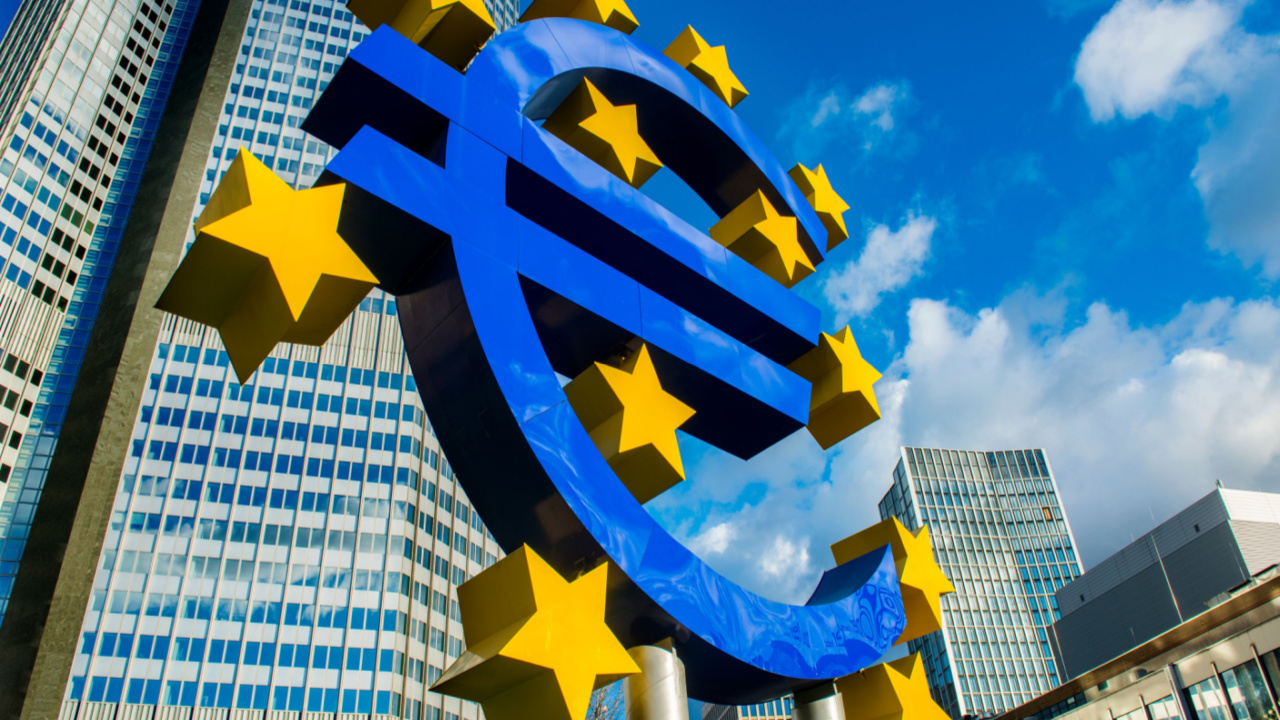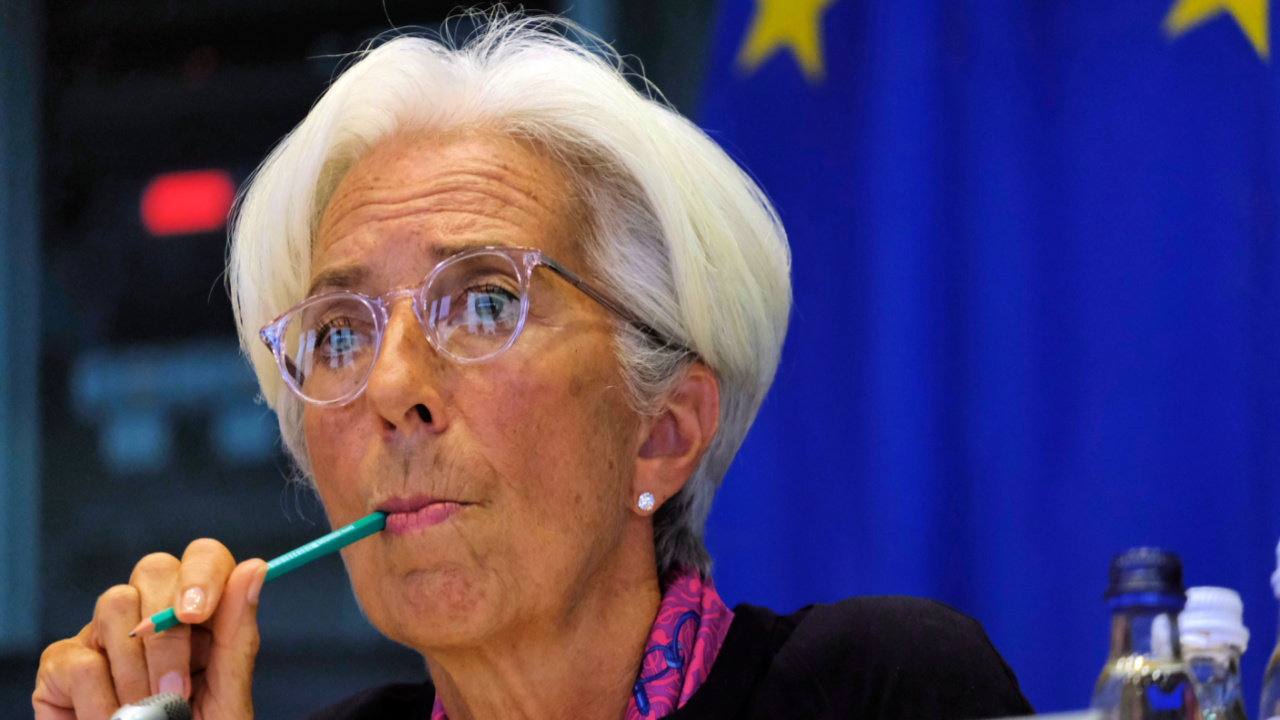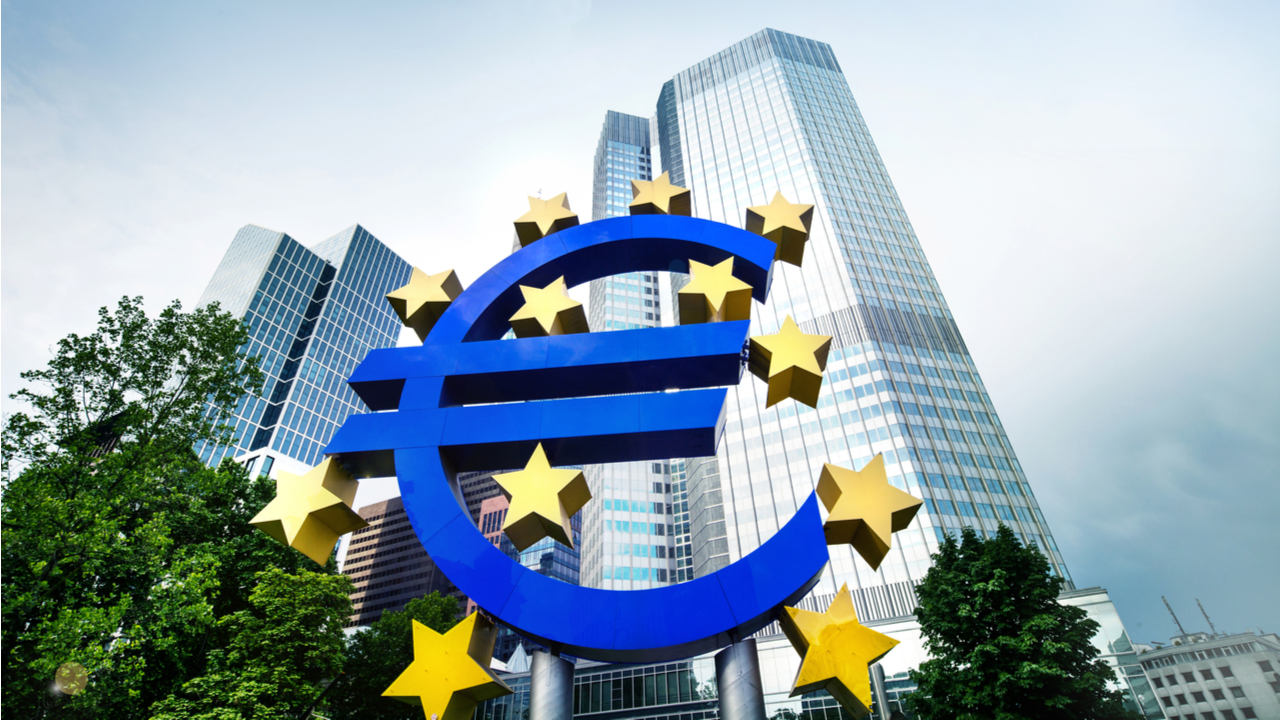 A group of economists evaluating the potential effects of a digital euro have insisted that restricting access to the upcoming currency is necessary to preserve the current financial system. Their study follows an earlier proposal to limit digital euro deposits at the European Central Bank (ECB) to €3,000 per person. Limited Availability of Digital Euro […]
A group of economists evaluating the potential effects of a digital euro have insisted that restricting access to the upcoming currency is necessary to preserve the current financial system. Their study follows an earlier proposal to limit digital euro deposits at the European Central Bank (ECB) to €3,000 per person. Limited Availability of Digital Euro […] Unbacked cryptocurrencies are not an efficient means of payment and stablecoins are vulnerable to runs, top officials at the European Central Bank have pointed out in a new article making the case for a digital euro. The executives have marked key objectives for the project which should provide Europeans with “easy access to central bank […]
Unbacked cryptocurrencies are not an efficient means of payment and stablecoins are vulnerable to runs, top officials at the European Central Bank have pointed out in a new article making the case for a digital euro. The executives have marked key objectives for the project which should provide Europeans with “easy access to central bank […]
European Central Bank researchers anticipate a clash between the green transition policies and Bitcoin investors.
Amid the soaring inflation, the European Central Bank (ECB) has found time to sum up its concerns about the “significant carbon footprint” of Bitcoin (BTC) and other cryptocurrencies, which require vast amounts of computational power.
ECB published the report titled “Mining the environment – is climate risk priced into crypto-assets?” on July 12. In the report, the ECB research group reinforces the environmental narrative about the battle of protocols, where the proof-of-work (PoW) concept represents a threat to the planet. In contrast, the proof-of-stake (PoS) is the only sustainable crypto option, experts argue.
The article compares the amount of consumed energy by Bitcoin to the yearly energy consumption of individual countries, such as Spain, the Netherlands and Austria. It claims that the combined carbon footprint for Bitcoin and Ether (ETH) negates past the greenhouse gas (GHG) emission savings for most Eurozone countries as of May 2022.
As the main reason behind the significant energy consumption lies in the PoW consensus mechanism, authors deem both Bitcoin and tokens based on the Ethereum blockchain, including stablecoins like Tether (USDT), as particularly non-sustainable and putting the whole green transition project at risk. In July, Ethereum completed a significant trial for the Merge on the Sepolia testnet, pushing the platform nearer to the shift to the PoS consensus mechanism.
Related: NYC Mayor Eric Adams speaks out against PoW mining ban legislation
At some point, the article sharpens the tension between the green transition goals and crypto in large up to the point of a possible war. Political and social choices on energy sources and energy consumption levels could lead policymakers to privilege certain productive activities, which, in turn, would bring risks for crypto-assets valuation.
According to the report, the benefit of Bitcoin for society is doubtful, and thus:
“It is difficult to see how authorities could opt to ban petrol cars over a transition period but turn a blind eye to bitcoin-type assets built on PoW technology.”
In a further car analogy, the report claims the PoS is the crypto version of the electric vehicle and an obvious candidate for policymakers' incentivization.
Last week the ECB released a report analyzing the growth of the cryptocurrency market over the past decade and the risks it poses to the existing financial system. It concluded that a lack of regulatory oversight added to the recent downfall of algorithmic stablecoins ecosystems such as Terra (LUNA), indicating the contagion effects such stablecoins could have on the financial system.
 A new report by the European Central Bank (ECB), presented as a “deep dive into crypto financial risks,” calls for “appropriate” regulation and oversight of stablecoins and decentralized finance (defi). It also addresses the hot topic of Bitcoin’s carbon footprint in Europe, suggesting a ban on proof-of-work mining is probable. Growth of Stablecoins, Defi Warrants […]
A new report by the European Central Bank (ECB), presented as a “deep dive into crypto financial risks,” calls for “appropriate” regulation and oversight of stablecoins and decentralized finance (defi). It also addresses the hot topic of Bitcoin’s carbon footprint in Europe, suggesting a ban on proof-of-work mining is probable. Growth of Stablecoins, Defi Warrants […]
A new report from the European Central Bank (ECB) finds that climate change may force carbon taxes on crypto transactions as well as a ban on mining proof-of-work assets like Bitcoin (BTC). The report finds that since authorities in the EU decided to heavily regulate gasoline vehicles as a means of cutting back greenhouse gas […]
The post Climate Change To Force Bitcoin Ban and Carbon Taxes on Crypto Transactions, Says ECB Official appeared first on The Daily Hodl.
 Eight days ago, the euro tapped a record low against the U.S. dollar as it hit $1.028 per unit against the USD last Tuesday. This week, the official currency for 19 of the European Union’s member states reached parity against the U.S. dollar for the first time in 20 years. Euro Hits Parity Against the […]
Eight days ago, the euro tapped a record low against the U.S. dollar as it hit $1.028 per unit against the USD last Tuesday. This week, the official currency for 19 of the European Union’s member states reached parity against the U.S. dollar for the first time in 20 years. Euro Hits Parity Against the […]
The French presidency of the European Union winds down with the completion of wCBDC experiments, the design of a proprietary blockchain and an automated market maker platform.
The first phase of experiments with a wholesale digital euro has been completed, and Phase 2 experiments will begin this year, Banque de France governor François Villeroy de Galhau said Tuesday. Four or five new experiments are expected to be launched.
Speaking at the Paris Europlace International Finance Forum, the French central banker summed up the European Union’s achievements in crypto-asset regulation under the French presidency, mentioning the Transfer Fund Regulation (Travel Rule) and Markets in Crypto-Assets (MiCA), specifically.
The Eurosystem is looking at the scope and design of a digital euro central bank digital currency (CBDC). The main rationale for a retail digital euro is to maintain the role of central bank money in the economy even as it is “threatened by the digital revolution,” Villeroy de Galhau continued. He spoke in favor of maximum intermediation in the design, noting that intermediaries have more experience than central banks with customer relations and Know Your Customer/Anti-Money Laundering (KYC/AML) measures. He said:
“I believe that the Eurosystem should not have the role of managing digital euro holdings: the Banque de France closed its last private customer accounts over 20 years ago, and does not intend to reopen any.”
A wholesale CBDC, to be used for interbank transfers and similar transactions, will be no less important than the retail, Villeroy de Galhau said. He cited the critical use cases of settlement of securities issued with digital ledger technology (DLT) and cross-border and cross-currency payments. The Banque de France designed a proprietary digital ledger technology, called DL3S, for a potential future system. It also produced an automated market maker platform based on a decentralized finance model, where settlements of multiple CBDCs could be carried out.
Related: ECB officials prepare for ‘harmonization’ of crypto regulations: Report
New experiments will involve testing a prototype digital euro with private actors and other central banks in preparation for the 2023 implementation of the pilot regime. Villeroy de Galhau stressed the importance of interoperability between DLT and the traditional system. DLT will complement rather than replace traditional infrastructure, he said.

Traders are not as fearful as they were in June, but several metrics show the market is still standing on paper-thin support levels.
The total crypto market capitalization has fluctuated in a 17% range in the $840 billion to $980 billion zone for the past 28 days. The price movement is relatively tight considering the extreme uncertainties surrounding the recent market sell-off catalysts and the controversy surrounding Three Arrows Capital.

From July 4 to 11, Bitcoin (BTC) gained a modest 1.8% while Ether (ETH) price stood flat. More importantly, the total crypto market is down 50% in just three months, which means traders are giving higher odds of the descending triangle formation breaking below its $840 billion support.
#Bitcoin Bottom scenario :
— Aditya Siddhartha Roy❁ (@Adityaroypspk) July 7, 2022
Since #BTC downtrend from its peak $BTC has farming the same Decending triangle pattern every time, but each triangle is becoming smaller
We might see another breakdown from triangle & 400WMA can be bottom #Crypto #cryptocurrencies #cryptocurrency https://t.co/BsXBAJHa4P pic.twitter.com/oAQ0IX5XgU
Regulation uncertainties continue to weigh down investor sentiment after the European Central Bank (ECB) released a report concluding that a lack of regulatory oversight added to the recent downfall of algorithmic stablecoins. As a result, the ECB recommended supervisory and regulatory measures to contain the potential impact of stablecoins in European countries' financial systems.
On July 5, Jon Cunliffe, the deputy governor for financial stability at the Bank of England (BoE) recommended a set of regulations to tackle the cryptocurrency ecosystem risks. Cunliffe called for a regulatory framework similar to traditional finance to shelter investors from unrecoverable losses.
The bearish sentiment from late June dissipated according to the Fear and Greed Index, a data-driven sentiment gauge. The indicator reached a record low of 6/100 on June 19 but improved to 22/100 on July 11 as investors began to build the confidence in a market cycle bottom.

Below are the winners and losers from the past seven days. Notice that a handful of mid-capitalization altcoins rallied 13% or higher even though the total market capitalization increased by 2%.

Aave (AAVE) gained 20% as the lending protocol announced plans to launch an algorithmic stablecoin, a proposal that is subject to the community's decentralized autonomous organization.
Polygon (MATIC) rallied 18% after projects formerly running in the Terra (LUNA) — now called Terra Classic (LUNC) — ecosystem started to migrate over to Polygon.
Chiliz (CHZ) hiked 6% after the Socios.com app announced community-related features to boost user engagement and integration with third-party approved developers.
The OKX Tether (USDT) premium measures the difference between China-based peer-to-peer trades and the official U.S. dollar currency. Excessive cryptocurrency retail demand pressures the indicator above fair value at 100%. On the other hand, bearish markets likely flood Tether's market offer, causing a 4% or higher discount.

Tether has been trading at a 1% or higher discount in Asian peer-to-peer markets since July 4. The indicator failed to display a sentiment improvement on July 8 as the total crypto market capitalization flirted with $980 billion, the highest level in 24 days.
To confirm whether the lack of excitement is confined to the stablecoin flow, one should analyze futures markets. Perpetual contracts, also known as inverse swaps, have an embedded rate that is usually charged every eight hours. Exchanges use this fee to avoid exchange risk imbalances.
A positive funding rate indicates that longs (buyers) demand more leverage. However, the opposite situation occurs when shorts (sellers) require additional leverage, causing the funding rate to turn negative.

Related: Analysts say Bitcoin range ‘consolidation’ is most likely until a ‘macro catalyst’ emerges
Perpetual contracts reflected a neutral sentiment as Bitcoin (BTC), Ethereum (ETH) and Ripple (XRP) displayed mixed funding rates. Some exchanges presented a slightly negative (bearish) funding rate, but it is far from punitive. The only exception was Polkadot's (DOT) negative 0.35% weekly rate (equal to 1.5% per month), but this is not especially concerning for most traders.
Considering the lack of buying appetite from Asia-based retail markets and the absence of leveraged futures demand, traders can conclude that the market is not comfortable betting that the $840 billion total market cap support level will hold.
The views and opinions expressed here are solely those of the author and do not necessarily reflect the views of Cointelegraph. Every investment and trading move involves risk. You should conduct your own research when making a decision.

A recent ECB report says stablecoins are not practical as a mode of payment and their current form isn't fit for use in the real economy.
The European Central Bank (ECB) has released a report analyzing the growth of the cryptocurrency market over the past decade and the risks it poses to the existing financial system.
A section of the report dedicated to stablecoins discussed the central role that it plays in the current ecosystem. Stablecoins are increasingly used to interlink various blockchain networks and play a critical role in offering liquidity to the decentralized finance (DeFi) ecosystem.
The report further analyzed whether these stablecoins could find a place in the traditional financial system, but concluded that a lack of regulatory oversight added to the recent downfall of algorithmic stablecoins ecosystems such as Terra indicates the contagion effects such stablecoins could have on the financial system. An excerpt from the report read:
“The largest stablecoins serve a critical function for crypto-asset markets’ liquidity, this could have wide-ranging implications for crypto-asset markets if there is a run-on or failure of one of the largest stablecoins.”
It was not just the algorithmic stablecoins that faced the crisis during the crypto market crash in May, even centralized stablecoin Tether (USDT) lost its peg for a while and saw nearly 10% in outflows.
The ECB also shot down the idea of using stablecoins as a means of payment, claiming these are not practical as the speed and cost as well as their redemption terms and conditions have proven “inadequate for use in real economy payments.”
The ECB recommended appropriate supervisory and regulatory measures to ensure stablecoins don’t pose a risk to financial stability in European countries. However, the report did note that stablecoin penetration in the region is limited given that European payment service providers have not been very active in stablecoin markets thus far.
Related: Experts weigh in on European Union’s MiCa crypto regulation
The European Union recently approved the Markets in Crypto-Assets (MiCa) framework that offers guidance for crypto asset service providers (CASPs) to operate within the Europe region. The provisional agreement includes rules that will cover issuers of unbacked crypto assets, stablecoins, trading platforms and crypto-wallets.
3/13 Large stablecoins will be subject to strict operational and prudential rules, with restrictions if they are used widely as a means of payment, and a cap of 200€millions in transactions/day.
— Ernest Urtasun (@ernesturtasun) June 30, 2022
The ECB aims to curtail stablecoin issuance to e-money institutions and credit institutions to ensure that a Terra-like incident doesn’t lead to investors losing billions of dollars.

A new report says the European Central Bank (ECB) is set to caution European Union (EU) members against pre-empting crypto rules being prepared for the Eurozone. The Financial Times report says that the ECB is concerned about the chaos that would be occasioned by the introduction of varying and potentially clashing crypto regulations by different […]
The post Nineteen Countries To Receive Warning From ECB on Eurozone Crypto Regulation Standards: Report appeared first on The Daily Hodl.